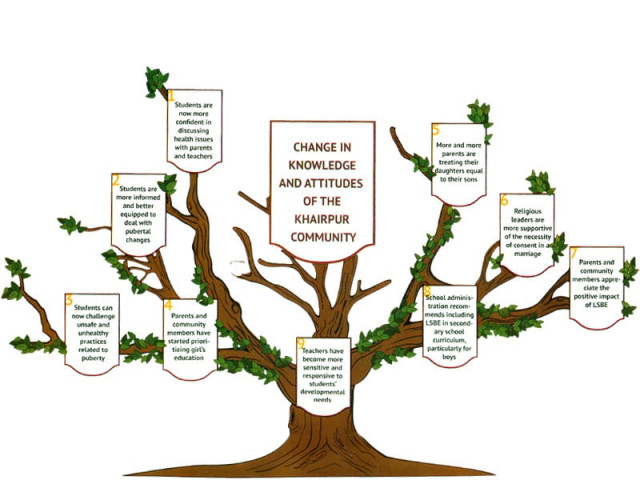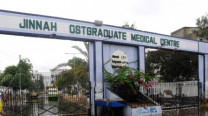Changing lives: Actions speak louder than words in raising health awareness
Students perform skit to explore Indus Resource Centre’s role in raising health awareness.

Students from Khairpur perform a skit to explore Indus Resource Centre’s role in raising health awareness through its three-year-long project. PHOTO: INDUS RESOURCE CENTRE
Well explored debates can and do have a profound impact on the listener. But every now and then, amateur theatre gets the message across in a way that even the most qualified panels of experts relying merely on words fail to achieve.
Around 20 students, aged between 13 and 15 years, presented a skit to express the main social and developmental issues tackled by the Indus Resource Centre (IRC) in three tehsils of Khairpur during a three-year-project, Reproductive Health through Girls’ Education, beginning in 2009. Journalist Zubeida Mustafa and the director of Aurat Foundation, Mehnaz Rehman also attended the event at Beach Luxury Hotel on Tuesday.
The students took to the stage in groups of three to four. Each group enacted hypothetical situations showing women in rural areas make sacrifices for their fathers, brothers and husbands, and the impact these sacrifices had on their health and personal development. At the back of the stage, a seven-member-group of girls analysed what was happening in every part of the skit in the form of a song.
At one point a character, who played the role of a woman taken out of school at a young age, swore that she would not let the same thing happen to her younger sister. She watched helplessly when her father married off her sister at an early age as well. The actors and actresses successfully acted out complex family systems, such as watta-satta - a cultural tradition in which women are exchanged in marriage. At the end of the skit, the villagers gathered to hear IRC representatives speak on health.

The skit moved many of the audience members to tears. One audience member felt that amateur theatre had the power to initiate a social revolution in Pakistan. “The children who went door-to-door singing to the wealthy about their woes in the French revolution were a significant component of the movement,” he pointed out.
Earlier, representatives from IRC spoke about the project. “IRC has been working in Sindh since the past 12 years,” said Naved Khayal, the regional manager of the organisation. “It was established in 1999 and it went on to acquire geographical reach in almost all of Sindh.”
Life Skills Based Education project
“We realise that the education given to students in rural areas of Sindh doesn’t address health issues and therefore, it doesn’t make a substantial impact on the quality of women’s lives,” said Khayal. To address this problem, the organisation partnered with NGO Aahung to launch a project, Life Skills Based Education (LSBE) to raise awareness about reproductive health and rights among children aged six to 10 in rural areas.
“We would hold discussions with the people in groups rather than interacting with them one-on-one,” said Kausar Khan, another representative from the organisation. “This was done to encourage the people to discuss the issues in our absence as well.”
IRC’s Sara Zaman pointed out that the teams had organised 161 focus groups to collect the data. “We realised that women are most mobile in the lowest classes, where the husband is not earning and she must run the household, and the upper-most classes, where they are so well-off that they do not feel the need to be constrained by cultural norms,” said Sara.
She also pointed out that the existing systems of education teach little about health. She recalled a conversation she had with a colleague in Shahdadkot recently who told her that most girls in the area stopped going to school after the age of 12. “The girls are afraid that they might be labelled kari and killed.”
Published in The Express Tribune, May 22nd, 2013.



















COMMENTS
Comments are moderated and generally will be posted if they are on-topic and not abusive.
For more information, please see our Comments FAQ